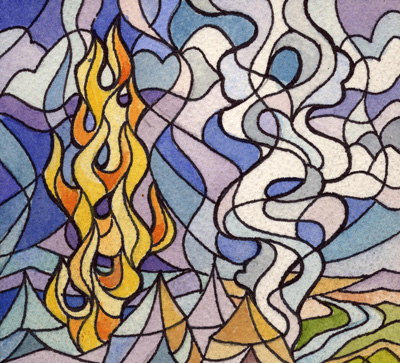Beshalach
Permanent link All Posts
In this week's portion, Beshalach, the Israelites have just left Egypt and are being led by a pillar of cloud by day and a pillar of fire by night into the wilderness. God has Moses encamp the Israelites alongside the sea, and then proceeds to harden Pharaoh's heart one final time. Pharaoh pursues the Israelites with his entire military might, and ultimately, the sea swallows up his forces as the Israelites cross over into freedom.
The Israelites then burst into spontaneous song, and Miriam leads the women in dance.
Only a few days after this incredible experience, the Israelites were already grumbling about the lack of water, and shortly thereafter, the lack of food. I'm pretty sure this is where we learn that the surest way to keep Jews happy is with lots of food and drink. (Notice how many Jewish communal events offer refreshments!).
In response to their calls for food, God sends manna, which falls like dew each morning. Interestingly, manna was only good for a single day (it would be moldy by the next), except on Fridays, when the Israelites were instructed to collect a double portion, because God would not send any manna on Shabbat (it's the day of rest after all). It's due to this double portion on Fridays that we traditionally use two challahs to make hamotzi on Friday nights!
The Israelites are thirsty again, and God tells Moses to strike a rock, which will result in water coming forth from it. Moses does so, and the water flows. (This is a bit hard to wrap one's arms around, as later in the Torah, God instructs Moses to speak to a rock in order to bring forth water, but Moses instead strikes it and as a result is prohibited from entering the Promised Land. Moral of the story: pay close attention to instructions!)
At the end of the portion, the Israelites are attacked by the nation of Amalek. Ultimately, the Israelites are victorious, and God declares that the memory of Amalek will be blotted out from under heaven.
I often have a really hard time understanding our Israelite ancestors, and why they couldn't seem to simply have faith that everything was going to work out in their favor. They had witnessed the 10 plagues, had gone out from Egypt with riches, and had watched the destruction of their former tormentors in the sea. Yet only a few days later, they were already complaining to Moses again due to a lack of food and drink. Perhaps their bondage wasn't as bad as we think it was? Perhaps they had developed a bit of Stockholm Syndrome? Or perhaps their fear of the unknown was truly more terrifying than the existence they had known?
Rather, what we can take away from this week's portion is an appreciation of just how challenging it is to think beyond your next meal for those who are food insecure. We often take for granted our ability to see the big picture and to have faith, given that much of our community is fortunate enough to have its basic needs met.
In 2012, 49 million Americans lived in food insecure households (33.1 million adults and 15.9 million children).
That's almost 15 percent of our population. And that's in America – let alone the developing world.
This Shabbat, reflect on the blessing of knowing where your next meal is coming from. Appreciate that others may not have the ability to think about big picture happenings, or to have faith that everything will work out, given their focus on simply surviving. Take the food stamp challenge (like Lindsey and Mark did). Commit to finding meaningful ways to help feed those in need, and to create sustainable changes in our systems and processes that will allow for none to go to bed at night hungry.



.jpg)



